
An open letter to Foreign Secretary David Lammy
As David Lammy prepares for his first trip to China as Foreign Secretary, Tibet groups in the UK urge him not to sacrifice human rights for trade
Dear Foreign Secretary,
We write on behalf of UK-based Tibet groups and the thousands of Tibetan community members based in the UK ahead of your first crucial visit to China with a clear message: you must ensure human rights and Tibet remain at the top of the agenda for the UK government.
Your meeting takes place at a historic low point for human rights in Tibet as the Chinese government increases its control in Tibet and intensifies policies designed to eradicate the distinct culture, way of life, and identity of the Tibetan people. Meanwhile, increasing instances of transnational repression are being inflicted on Tibetan communities around the world including the UK. It is critical that you use your first visit to China as Foreign Secretary to raise these crucial issues directly with Beijing.
A successful China policy is one in which the UK directly challenges the Chinese government’s human rights abuses against the Tibetan people,working alongside other concerned governments to seek accountability for these abuses and challenging the Chinese government’s attempts to undermine the international human rights system. It also means striving for a just and lasting settlement of the Tibet-China conflict that upholds Tibetans’ rights, not least their legal and fundamental right to self-determination.
Although few details of your upcoming visit have been released by the government, reports about the meetings you will be holding in Beijing give us reason for concern. We are aware that the UK government plans to hold a “reset” with the Chinese government to establish friendlier ties and promote investment and job creation.
Recent history shows us that unless this reset contains an assertive call for an end to the Tibet-China conflict and immediate and verifiable human rights reform, it will achieve little of long-term value, and will ultimately lead the UK back to the failed policies of the so-called “Golden Era” of the 2010s when the human rights situation in Tibet sharply deteriorated. Decades of human rights diplomacy by foreign governments have failed to deter Chinese authorities, particularly Xi Jinping, from deepening the repression in Tibet. Instead it has been taken as an invitation to assert further control.
With Tibet remaining closed off to independent journalists, diplomats and human rights monitors, one of the only forms of leverage that exists is for China’s trading partners to press the Chinese government to release political prisoners and abandon policies that threaten the lives and livelihoods of Tibetans.
This does not mean halting negotiations on trade or global cooperation with China to address pressing global concerns, but it does mean using these meetings to speak up for Tibetans as they face multiple threats to their homeland and identity, and the UK government pairing its diplomacy with concerted pressure on Beijing to end its human rights abuses in Tibet, addressing transnational repression against Tibetans in the UK and calling a just resolution of the Tibet-China conflict.
Given your previous work and well-known interest in decolonisation and the effects of imperialism, we are sure you will appreciate the importance that the UK’s interactions with the Chinese government have for Tibetans, living under occupation or in exile, and that they, along with Tibet groups, and Tibet supporters will be paying close attention to the issues you raise, and those that you do not raise, during your visit.
With these considerations in mind, we urge you to use your visit to:
- Reiterate the UK’s previous call for China to follow the recommendations of UN experts to immediately abolish China’s colonial and coercive boarding school system imposed on Tibetan children in Tibet. Furthermore, call for an end to the closure of Tibetan schools and for the re-opening of those that have been shut down.
- Press for the immediate release of all Tibetan human rights defenders and end persecution of their families including the community leader and anti-corruption activist A-Nya Sengdra, Tibetan monk and religious philosopher Go Sherab Gyatso, and Jampa Choepel, who was detained after publishing a post about the teachings of the Dalai Lama;
- Seek information about Gedhun Choekyi Nyima, the 11th Panchen Lama of Tibet, who has been missing since his abduction in 1995. This must include tangible proof of his whereabouts, safety, and well-being.
- Urge a moratorium on the building of megadevelopment projects including mines and hydropower dams in Tibet until Tibetans have given full prior, free, and informed consent to all development projects. Specifically raise the threat of the Kamtok Dam and other massive hydropower dam projects, which are forcing Tibetans from their homes and threatening monasteries with destruction from rising waters.
- And in addition to these human rights concerns, address Tibet’s status by calling for a return to direct dialogue with the representatives of the Tibetan people, to end the Tibet-China conflict.
Upon conclusion of your visit, we also urge that you meet with Tibet groups and members of the Tibetan community.
The UK government’s stated policy towards the Chinese government is to cooperate where it can, compete where it needs to, and challenge where it must. Your meetings this week offer their own challenge: should you return to the UK with promises of jobs and investment but without taking a stand for Tibet, you will have sold out Tibetans and their human rights including those who are UK citizens.
On the other hand, should you be bold, and seize the moment to speak out on Tibet and challenge China over its human rights abuses, it will show that this new Labour government can be a positive force for change and an example for other governments to follow.
 Free Tibet
Free Tibet
International Tibet Network
Tibet Action Institute
Voluntary Tibet Advocacy Group UK

